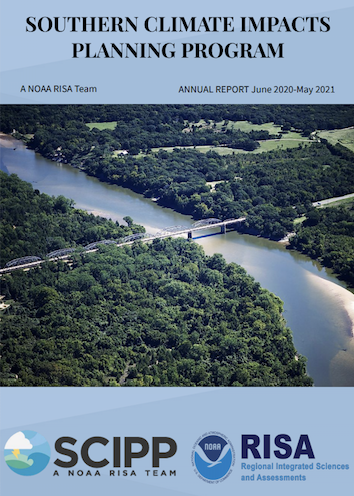SCIPP’s latest annual report provides an overview of our accomplishments, collaborations, research, and outreach from June 2020 through May 2021.
The annual report presents SCIPP’s extensive network of connections with both RISA teams and other climate research organizations. Some of the collaborative projects highlighted in the report include but are not limited to: 1) the SCIPP-GLISA Research to Action Project for Gulf Coast communities who are vulnerable to extreme precipitation and flooding, 2) an ongoing partnership with personnel at Louisiana, Mississippi-Alabama, and Texas Sea Grants to investigate how meteorological variables impact crawfish yields in research ponds in Baton Rouge, LA, and 3) SCIPP’s enhanced research outputs with Texas Sea Grant through a variety of climate information resources which focus on crucial problems such as sea-level rise and soil moisture variation in drought-prone areas.
A diverse collection of research projects are also included: 1) a social network-based project intended to improve connectivity between the National Climate Assessment and stakeholders, 2) how National Weather Service forecasters in the SCIPP region process and communicate extreme rainfall events, 3) a new tool that shows historical trends in temperature for locations across the state of Texas, and 4) a comparative case study of hazard mitigation planning in six inland countries in the SCIPP region.
A unique feature of this annual report is its coverage of COVID-19 impacts on SCIPP’s in-person engagement efforts. While many engagements were able to take place virtually, the SCIPP team experienced limitations with obtaining quality feedback and discussions. However, SCIPP found ways to serve our stakeholders through virtual outreach such as the Gulf Coast Water Workshop, a NOAA-designed workshop hosted by SCIPP in July 2020.
SCIPP’s mission is to assist organizations with making decisions that build resilience by collaboratively producing research, tools, and knowledge that reduce weather and climate risks and impacts across the South Central United States. Accordingly, the application of SCIPP’s mission objectives is detailed throughout the annual report.
To download the full version of the report, click here. To view the archive of SCIPP’s annual reports, visit the About SCIPP Page.

